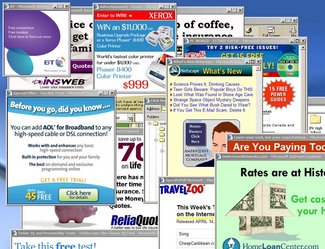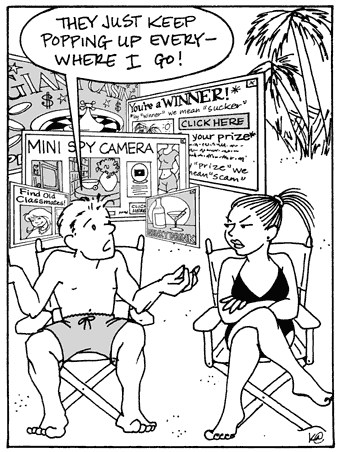Courses/Computer Science/CPSC 203/CPSC 203 2007Fall L04/CPSC 203 2007Fall L04 TermProjects/Popper Uppers
Contents
Group
Group Name
Peanut Butter Jelly
Group Members
- Narmin Bawa
- Kelsey MacLeod
- Alejandra Hoebel
- Terence Ng
- Dominik Rozwadowski
Initial Project Statement
- Many internet users today are affected by pop-ups while using Internet Explorer. We will be looking into how pop-ups 'pop-up', various threats pop-ups pose, and what can be done to eliminate these pests.
Argument
Many sites we often visit have ads just like newspapers to help support the site. The problem with these ads is that sometimes they create a new window called pop-ups. The objective of a pop-up is to catch the viewers attention forcefully by literally popping up in front of the viewer. As harmless as it may seem, eventually the pop-up was abused by flooding any given site with numerous pop-ups at a time. Aside from the annoyance factor, pop-ups may also carry spyware and similar self downloading softwares. Many leading internet browsers such as IE, Netscape, and Firefox often provide so called updates to their browsers with built in pop-up stoppers. However, just like playing cops and robbers, there will always be people out there trying to think of ways to go around these pop up stoppers at the same time major internet browser providers will try to terminate pop-ups. It is then important for us as the general public population to have a basic idea of what the main purpose behind these pop-ups and how we can protect ourselves in the case that a pop-up has more to it than offering a "free iPod if you click here."
What are Pop-Ups
Pop-ups are windows that pop up when certain webites are visited. Unfortunately, most of the time these are unwanted advertisements. However, there are also other more practical uses for pop-ups such as for logins and/or screens used to request additional information. Pop-ups are in the form of an extra window that appears over top of existing windows. The main language used to create pop-ups are often generated by javascript.
Background of Pop-ups
Before the introduction/creation of internet pop-ups, website banner displaying various ads were the main form of internet advertising. However, after the “dot-com crash”, prices paid for banner advertising as well as click-throughs decreased and pop-up ads rose in popularity for as the new advertising tool. Pop-ups are claimed to be much more effective than web banner ads – every 14000th pop-up ad is clicked on proving to be an inexpensive and effective advertising scheme.
How Pop-ups Work
Pop-ups are created by using the scripting language Javascript. Javascript allows new windows embedded in websites to poo-up. Some pop-ups a programmed to spawn on other pop-ups when users try to exit out of them.
Javascript
Javascript is a scripting language most often used for client-side web development. It enables scripting access to objects embedded in other applications. Javscript engines rely on a host environment into which it is embedded, a best known example of this being the web browser. Programmers can use Javascript to write functions that are embedded or included from HTML packs.
This is the technology of choice for pop-ups because Javascript includes programmatic control over the size, position and look of a new pop-up window. It can also validate web form input values to make sure they will be accepted before they are submitted to the server. All of this is possible due to the fact that javascript runs on the client rather than the server, therefore it is able to quickly respond to user actions.
Security
Javascript has security restrictions in an effort to prevent malicious authors from delivering scripts to un on a client computer via the web.
Contains risks using 2 restrictions:
Scripts run in a SandBox : can only perform web related tasks, not general-purpose programming tasks (ex. Creating files). Scripts contained by the “same origin policy”: scripts from one website do not have access to information such as usernames, passwords, or cookies sent by author site.
Variations of Pop-ups
Pop-unders
These launch new internet broswer windows underneath any currently existing active windows. Users do not usually realize they are their until they exit their browsers.
Exit Consoles
These are pop-ups that appear as soon as a page or site is closed. Exit consoles sometimes make it difficult to determine the source of the pop-ups.
Floating Ads
These look similar to pop-ups but are triggered by more advanced mechanisms. This usually consists of a special code embedded in a website page as soon as it is viewed. The appearance of these are more graphical in nature they can hover or zoom around the window.
Timed Pop-Ups
Timed pop-ups can be set to open a certain time after the website page has been opened.
Spyware and Adware
If you are experiencing pop-ups, regardless of the website, you may be inadvertently running a program on your computer such as spy-ware and ad-ware. Spy-ware is a program used to describe any piece of software that is meant to be installed locally on your computer; it is used to send behavioural data back to the company that created it. Ad-ware is another program quite similar to spy-ware. Its purpose is to bombard the user with advertisements.
Why are Pop-ups Used
Pop-ups exist primarily for one reason: to fund websites. Because websites are paid by the advertisers to display the ads, our computers are constantly getting attacked by pop-ups. Websites get paid for every pop-up that appears on the screen while visiting that website. Another reason pop-ups are used is the fact that some websites want to extract information from you, such as your email address, postal code, etc, and by displaying pop-ups you get tricked into filling out your personal information and the websites are able to obtain your information easily. For example, if a pop-up for a contest appears, people are tempted to fill out the information in order to win a particular prize.
Viruses
Viruses are sometimes used to deliver advertisements and pop-ups and can be spread from computer to computer without the consent of the person using it. However, most viruses that deliver software are picked up and removed.
How to Remove Pop-ups
Determine the source.
Pop-ups Caused by Websites
A few ways to fix problems caused by pop-ups in websites is to update internet explorer browser. Recent versions include better pop-up protection also known as pop-up blockers. If you are using Windows XP go to http://update.microsoft.com/windowsupdate. If you are up to date and still seeing lots of pop-ups, upgrade to Mozilla Firefox. It has built-in pop-up protection, is one of the first web browsers to have that feature and it also imports all your internet explorer favorites automatically. Finally, you can add a toolbar, though be careful as 95% of toolbars are riddled with spy ware and it may worsen the problem. Some safe toolbars to use are: Google Toolbar, Yahoo Toolbar and Windows Live Toolbar.
Pop-ups Caused by Software
Certain software may harm your computer and caused your computer to be more prone to pop-ups. Constantly checking for viruses and by using antivirus software that is up to date and scans your entire PC are two easy ways to protect your computer from harmful spy-ware. You also should check for spy-ware frequently by installing easy-to-use spy-ware programs such as anti-ad-ware software or Spy-Bot. An example of a Spy-Bot program is “Spy-bot Search and Destroy”. This program is the most popular anti-spy-ware applications available and is completely free and simple to use. One must constantly update the program in order to detect the newest threats to the computer. Another example of these types of programs is “Ad-Aware Personal” which is another anti-spy-ware which scans your computer and removes spy-ware.
References
Terence Ng
http://www.straightdope.com/columns/041015.html
http://popup-toolkit.com/articles/artistic-popup-approach.html
http://www.wikihow.com/Stop-Internet-Popups
http://pgl.yoyo.org/adservers/
http://netsecurity.about.com/od/popupsandspyware/a/stoppopups.htm
http://www.mvps.org/winhelp2002/nopopups.htm
http://www.sitepoint.com/article/pop-ups-dead-links
http://www.usatoday.com/tech/news/2003-09-24-popups_x.htm
http://www.news.com/Revenge-of-the-pop-ups/2100-1024_3-5408453.html
http://www.frontpagewiz.com/dbarticles/eliminate_pop_ups.asp
Alejandra Hoebel
http://windowsxp.mvps.org/Popups.htm
http://en.wikipedia.org/wiki/Pop-up_ad
http://www.microsoft.com/windowsxp/using/web/sp2_popupblocker.mspx
http://ctlet.brocku.ca/webct/Allowing_Pop_Ups
http://www.mvps.org/winhelp2002/nopopups.htm
http://security.yahoo.com/article.html?aid=2006102508
http://www.news.com/2100-1032_3-5105139.html
http://www.msnbc.msn.com/id/3541497/
http://support.microsoft.com/kb/843016
http://help.yahoo.com/l/us/yahoo/toolbar/features/popupblocker/stillgetting/pub-10.html
http://www.winxptutor.com/sp2/allowhttps.htm
Dominik Rozwadowski
http://en.wikipedia.org/wiki/Pop-up_ad
http://windowsxp.mvps.org/Popups.htm
http://www.news.com/2100-1024_3-5110805.html
http://www.pcmag.com/article2/0,4149,929341,00.asp
http://www.i-web-marketing.com/
http://www.microsoft.com/protect/computer/basics/popup.mspx
http://knowledge.wharton.upenn.edu/article.cfm?articleid=828
http://www.impactpopup.net/google.html?gclid=CKvdk-_9lo8CFQqZggodMiuRfA
Kelsey MacLeod
http://drm.trs.virginia.gov/vaccs/popuphelp/popups.htm
http://www.wintipz.com/XP/PopUpBlocker.htm
http://www.internet-security-protection-software.com/stop-pop-ups.htm
http://windowshelp.microsoft.com/Windows/en-US/Help/6553df0e-c42b-4f47-8376-7e76950e8f241033.mspx
http://it.usu.edu/htm/tutorials/block-window-pop-ups-in-internet-explorer
http://de.lbcc.edu/resources_tools/files/popups.html
http://www.frontpagewiz.com/dbarticles/eliminate_pop_ups.asp
http://www.absolutefuturity.com/POP-Stopper/Turn%20Off%20Pop%20Ups%20In%20Internet%20Explorer.htm
http://www.wiredsafety.org/safety/personal_information_safety/pop_ups/index.html
http://www.cliffsclassics.com/popups.htm
Narmin Bawa
http://www.microsoft.com/protect/computer/basics/popup.mspx
http://www.mvps.org/winhelp2002/nopopups.htm
http://www.its.queensu.ca/itsc/faq/anti_virus_spyware/adware_spyware/what_are_popups.html
http://www.onlinetools.org/tools/dominclude/
http://www.ucalgary.ca/it/help/articles/security/protect/cookies
http://www.quest.uwaterloo.ca/help/howdoi/popups.html
http://www.spyware-refuge.com/popups.html


